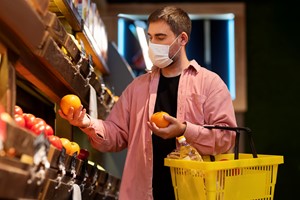Around the world, farmers are doing everything they can to prevent the coronavirus crisis from becoming a hunger crisis. Industries of all kinds have been forced to rapidly change how they work, and agriculture is no different.
Farmers are used to adapting to circumstances, whether it’s droughts, floods, or pest infestations. Overcoming unpredictable hurdles goes with the job, but the pandemic is bringing a range of new challenges to growing the food people depend upon. These challenges make it clear that more must be done to enhance the resilience of our food system. To understand these obstacles, we spoke to farmers, growers, producers and industry figures around the world to learn how they are adapting in this unprecedented time. Read more about How Farmers Are Keeping Us Fed through the Global Crisis.
“The farm is locked down: no one goes out, only the few necessary people come in,” says Julio Fernandez Speroni, a farmer running a 2,200 hectares operation in Argentina.
In the Southern Hemisphere, it’s harvest season. On his cattle and no-till agriculture farm, Julio and his limited team of five full-time employees have been “truly busy since the quarantine started”, harvesting the farm’s 400 hectares of soybeans, corn and wheat.
From the onset of Argentina’s restrictions, farmers were identified as essential to carry on working. “It’s important that they let us keep going,” explains Speroni. “You can’t abandon a field that has already been planted and is ready to be harvested. That would be a disaster.”
Only trucks with specific permits are allowed to travel the distances needed to transport harvested crops to ships and export markets. It makes it a difficult time to carry out some of the farm’s most important annual work, but travel restrictions also add unforeseen challenges.
“My son is on the farm with me doing online schooling,” says Speroni. “But my wife is at home with my two daughters, and we’ve been split for over a month now.”
Long periods of separation in remote areas are not uncommon in farming. However, the unprecedented nature of the coronavirus pandemic and the uncertainty about when travel restriction will be eased, creates new mental health challenges for isolated workforces. Speroni says: “It’s never happened before and we are all still getting used to it. It’s tough for my employees, who are cut off from their families.”
Speroni and his staff are using the available technology, much like the rest of the world, to bridge the distances put in place as a response to Covid-19. This same technology is also helping farmers to carry out their essential work across vast distances.
In addition to the farm he is currently living on, Speroni manages five other farms around the country. Unable to travel there, he is relying on technology as straightforward as photo messages to help him evaluate fields and assess with his teams what parts might need to be sprayed with fungicide or otherwise treated.
Julio is one example of how farmers around the world are adapting in the face of the pandemic and finding the solutions needed to continue delivering food globally. “Argentinian farmers and the Argentinian people in general are quick to adapt to these kinds of challenges,” says Speroni. He believes the extra effort and innovative thinking from farmers, workers, and officials to pull through the pandemic will enable the industry to endure and once again thrive.











